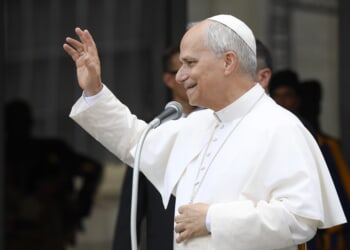Nothing quite exposes the shameless opportunism targeting modern Christianity like a freshly-minted religious conversion following a lucrative legal settlement. Enter Gabriella Zuniga, the OnlyFans entrepreneur who just discovered the Lord — coincidentally, right after taking Shannon Sharpe to the financial cleaners.
The timing feels miraculous, doesn’t it? One month, she’s pursuing legal remedies against the former ESPN analyst; the next, she’s photographing herself reading Isaiah and announcing her retirement from adult content creation. What divine intervention! What perfect timing! Surely this represents genuine spiritual awakening and not calculated public relations designed to transform a controversial figure into a sympathetic reformed soul.
The ruthless exploitation of Christian forgiveness represents spiritual vandalism of the highest order.
Yes, Zuniga could have genuinely encountered the divine. Scripture teaches that God works through all circumstances, even the most sordid ones. The Damascus Road experience can strike anyone, anywhere, even those emerging from courtroom victories. But here’s what should concern every believer: religious conversion has become America’s favorite redemption script, and we Christians keep falling for it.
This isn’t just about one woman’s convenient timing. It exposes how our Christian decency has become a target for exploitation. In our hunger for dramatic testimonies and our Christ-like eagerness to forgive, we’ve accidentally built a culture where professing faith functions as instant moral absolution — no matter how contrived or perfectly timed. The more theatrical the transformation — the porn star turned prayer warrior, the hustler turned holy man — the more irresistible we find the story.
We’re being played, and it’s time we admitted it.
The machinery of modern evangelical celebrity culture practically begs for these spectacular conversions. Publishing houses salivate over testimonies. Speaking circuits crave dramatic before-and-after stories. Christian media celebrates each fallen star who finds Jesus, regardless of whether their transformation will last past the book tour. We’ve commodified conversion, turning sacred encounters into marketable content — and shrewd operators have noticed.
Consider the financial incentives we’ve accidentally created. A reformed adult entertainer can command substantial fees on the Christian speaking circuit, write bestselling memoirs, launch devotional brands, and secure lucrative endorsement deals with faith-based companies. The earning potential of being a “former” something often exceeds the original career — especially when that career carries social stigma. For the calculating mind, conversion becomes not spiritual transformation but shrewd business pivot.
Meanwhile, authentic Christians who’ve lived quietly faithful lives for decades receive no platform. No book deals. No speaking engagements. Their steady faithfulness doesn’t have the drama that sells tickets or shifts merchandise. We cheer the prodigal’s return while ignoring the elder brother’s constancy — the exact opposite of what Scripture teaches us to honor. Our priorities are upside down, and opportunists are cashing in. Real Christianity demands hard self-examination, not convenient performances timed for approval. True conversion involves repentance that carries a cost, not positioning that lines pockets. When Paul encountered Christ on the Damascus Road, he spent years in obscurity proving his transformation through sacrifice and suffering — not Instagram posts and media interviews. His conversion cost him everything; today’s conversions seem suspiciously profitable.
The ruthless exploitation of Christian forgiveness represents spiritual vandalism of the highest order. Every fraudulent conversion cheapens authentic faith, making genuine seekers more skeptical and believers more cynical. It transforms the gospel into performance art, reducing sacred transformation to social media content. And we keep applauding.
This commodification creates perverse incentives throughout our culture. Why pursue steady moral living when spectacular falls and dramatic recoveries generate more attention and money? Why maintain consistent character when public failure followed by religious awakening offers greater rewards? We’ve made moral failure more rewarding than moral faithfulness.
This phenomenon exposes our own failures as Christians. We’ve become so entertainment-obsessed, so celebrity-hungry, that we celebrate conversions before examining their fruits. We cheer the dramatic testimony while ignoring the ordinary discipleship that should follow — and so often never does.
The pattern repeats with clockwork precision across American pop culture, and we fall for it every single time. Consider the parade of celebrities who seem to discover God precisely when their careers demand divine intervention. Britney Spears embraced Jesus during a public breakdown, right as custody battles threatened her legacy. Justin Bieber’s spiritual awakening arrived not in quiet obscurity but perfectly timed for his rebrand from teen idol to serious artist. Kanye West’s born-again phase launched alongside his presidential ambitions and fashion empire expansion.
Professional athletes have mastered this playbook with particular skill, knowing exactly how to tug at Christian heartstrings. Every steroid scandal produces a testimony. Every domestic violence arrest generates church attendance photo ops. Every DUI results in a baptism ceremony. The formula is so predictable it’s almost algorithmic: public sin plus media crisis equals religious conversion, followed by redemption tour, book deal, and speaking circuit — funded largely by well-meaning Christians who want to believe in second chances.
Reality television has perfected this exploitation entirely. The Bachelor franchise alone has spawned countless born-again influencers who discovered faith right after their fifteen minutes expired. Teen Mom stars regularly cycle through addiction, arrest, recovery, and religious awakening — often multiple times within a single season. Each phase generates fresh content, new endorsement opportunities, and renewed audience sympathy from Christians who keep buying the act.
American Christianity has essentially created an insurance policy for public scandal: mess up spectacularly, find Jesus dramatically, profit handsomely off Christian generosity.
It’s time we wised up.
True conversion transforms lives, not just press coverage. Perhaps Zuniga should prove her faith through years of quiet service rather than sprinting toward the spotlight. The strongest testimony isn’t a flashy before-and-after tale designed to pry open Christian wallets; it’s the slow, stubborn evidence of a heart truly changed, lived in obscurity, over time, without applause or profit.
Christians need to stop being such easy marks. Forgiveness and grace are sacred gifts, not marketing strategies for the morally bankrupt. We must learn to tell the difference between real repentance and cynical calculation — before our faith is reduced to nothing more than America’s most exploitable brand.
READ MORE from John Mac Ghlionn:
Why Democrats Can’t — and Won’t — Replicate MAGA
The Rotten Truth About the Egg Cartel
Bill Maher Wants You to Suffer




![Gavin Newsom Threatens to 'Punch These Sons of B*thces in the Mouth' [WATCH]](https://www.right2024.com/wp-content/uploads/2025/08/Gavin-Newsom-Threatens-to-Punch-These-Sons-of-Bthces-in-350x250.jpg)
![ICE Arrests Illegal Alien Influencer During Her Livestream in Los Angeles: ‘You Bet We Did’ [WATCH]](https://www.right2024.com/wp-content/uploads/2025/08/ICE-Arrests-Illegal-Alien-Influencer-During-Her-Livestream-in-Los-350x250.jpg)

![Black BET Billionaire Donor Stuns Democrats, Gives $500K to Winsome Earle-Sears [WATCH]](https://www.right2024.com/wp-content/uploads/2025/08/Black-BET-Billionaire-Donor-Stuns-Democrats-Gives-500K-to-Winsome-350x250.jpg)






